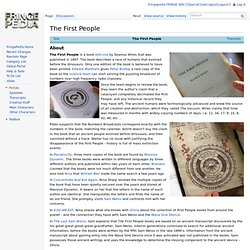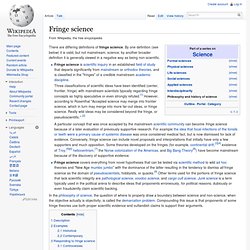

Glyphs code - Fringepedia - The FRINGE wiki. Fringe Television - Fan Site for the FOX TV Series Fringe. Fox TV Series Message Boards. The First People - Fringepedia - The FRINGE wiki. About The First People is a book (6955 kHz) by Seamus Wiles that was published in 1897.

The book describes a race of humans that evolved before the dinosaurs. Only one edition of the book is believed to have been printed. Edward Markham gives Peter Bishop a rare copy of the book so the science team can start solving the puzzling broadcast of numbers over high frequency radio channels. Once the team begins to review the book, they learn the author's claim that a cataclysm completely decimated the First People, and any historical record they may have left. Peter suspects that the Numbers Broadcasts correspond exactly with the numbers in the book, matching the calendar. In Reciprocity, three more copies of the book are found by Massive Dynamic.
In Concentrate And Ask Again, Nina Sharp reviews the multiple copies of the book that have been quietly secured over the years and stored at Massive Dynamic. Quotes "They were a people of great technological prowess who made the ultimate discovery. Fringe science. There are differing definitions of fringe science.

By one definition (see below) it is valid, but not mainstream, science; by another broader definition it is generally viewed in a negative way as being non-scientific. Fringe science is scientific inquiry in an established field of study that departs significantly from mainstream or orthodox theories, and is classified in the "fringes" of a credible mainstream academic discipline. Three classifications of scientific ideas have been identified (center, frontier, fringe) with mainstream scientists typically regarding fringe concepts as highly speculative or even strongly refuted.[1] However, according to Rosenthal "Accepted science may merge into frontier science, which in turn may merge into more far-out ideas, or fringe science.
Really wild ideas may be considered beyond the fringe, or pseudoscientific. " [2] Description[edit] Examples[edit] Historical[edit] Some historical ideas that are considered refuted by mainstream science include: Portal:Fringe Science - Fringepedia - The FRINGE wiki. Fringe (TV series) Early critical reception of the first season was lukewarm but became more favorable in subsequent seasons, when the series began to explore its mythology, including parallel universes and alternate timelines.
The show, as well as the cast and crew, has been nominated for many major awards. Despite its move to the "Friday night death slot" and low ratings, the series has received a cult following. It has also spawned two six-part comic book series, an alternate reality game, and three novels. The producers were strongly interested in "world building", and the parallel universe allowed them to create a very similar world with a large amount of detail to fill in the texture of the world. A parallel universe also allowed them to show "how small choices that you make define you as a person and can change your life in large ways down the line," according to co-director Jeff Pinkner.[18] However, the producers also realized the concept of the parallel universe could be confusing to viewers.